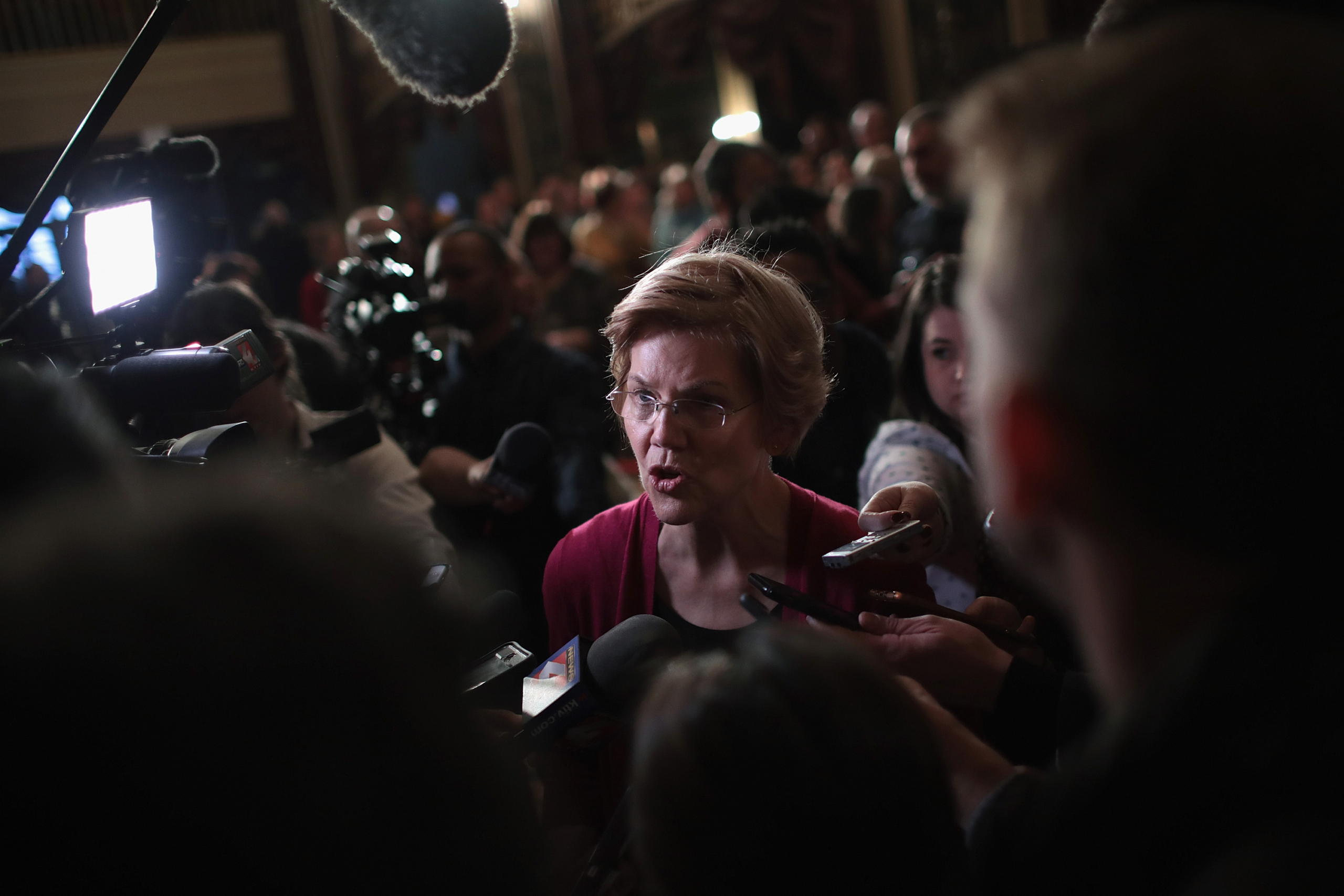Senator Elizabeth Warren’s New Year’s Eve campaign announcement instantly roused a gaggle of journalists to gear up for a new season of insider baseball—the behind-the-scenes color commentary brilliantly anatomized by Joan Didion eight presidential contests ago. This is one of our least illustrious traditions—the means-over-ends obsession with the tactics of winning, losing, setting, and changing horse-race expectations. No relief is in sight. But the good news is that the kind of campaign Warren wants to run, even misunderstood, might help raise the maturity level of our political discourse.
The temptation to dwell on tactics rather than purposes—to make guesses about how Warren’s campaign is playing, on the basis of slender to no evidence—ran wild. Her timing, her tactical acumen, or lack of it, were the journalistic obsession. Warren’s timing was awful! No, it was genius to dominate the weekend! She’s a woman! She’s the wrong woman! Thanks to her DNA announcement, her campaign’s over before it started! She’s on the defensive! She’s ducking the real question! Even The Washington Post, having quoted her announcement video, quickly moved on to a cheap gotcha, declaring (accurately) that Warren’s video “made no mention of a recent Warren stumble: her October decision to release results of a DNA test that said she probably had a distant Native American ancestor.” Whether that was a stumble or not, such inserts grant the candidate’s enemies the authority to set the agenda for her campaign: to wit, “Pocahontas.”
Politico decided she was haunted, offering up the headline “Warren battles the ghosts of Hillary,” adding “How does Warren avoid a Clinton redux—written off as too unlikable before her campaign gets off the ground?” Worse (no surprise) was Fox News, serving up a not-so-penetrating question from Pete Hegseth to Donald Trump: “Do you really think she believes she can win?” (“That I don’t know,” opined the White House’s resident expert assessor of mental states, “you’ll have to ask her psychiatrist.”) That was the line that went viral, of course.
Most of the news media rounded up clichés in clumsy attempts to “position” Warren amid the crowded Democratic field. “Economic populism” was the phrase du jour in the Post and her Massachusetts hometown Boston Globe, as well as elsewhere. That’s not bad for openers but it’s a deceptively firm-sounding phrase that needs a lot of unpacking. For it’s not that clichés are wrong, it’s that they’re largely empty. They obscure an important difference between social welfare programs and a revamping of corporate governance—the element that Warren, along with Senator Tammy Baldwin, has introduced to the national economic conversation. Phrases like “fiery liberalism” and “economic populism” blur the distinction between routine Democratic hopes to distribute income and social programs to benefit the 90 percent of Americans who have stagnated economically and Warren’s proposed Accountable Capitalism Act, which would require the biggest corporations to make room on their boards of directors (40 percent of the room) for workers. Imagine an American economic conversation that doesn’t assume that corporate boards have a right to absolute rule.
The AP dug into its platitude barrel with “her brand of fiery liberalism.” But what distinguishes Warren is not her temperature but the coherence of her world view. Like it or not, she offers something of a theory of everything about what’s wrong with America. (“How did we get here?”) This is not only more than Hillary Clinton did, it’s different. It’s a diagnosis and an outlook, not a list. It comes close to a theory of everything. The Post did well to quote this core of her message: “America’s middle class is under attack. How did we get here? Billionaires and big corporations decided they wanted more of the pie. And they enlisted politicians to cut them a bigger slice.”
What distinguishes Warren is not her temperature but the coherence of her world view.
Phrases like “fiery liberalism”—and its counterpart, “fierce conservatism”—are more water than fire. They’ve slushed up American political life for decades. It’s not that hard to point to what distinguishes Warren. For example, having made the obligatory stop at “economic populism,” Marketplace quickly moved on to sketch Warren’s “main economic platforms”—her themes.
It was Jill Filipovic, writing for CNN, who most clearly discerned that Warren’s priorities are clear: she wants economic and racial justice and recognizes that the two are neither identical nor severable. Most strikingly, she doesn’t issue a milquetoast call for unity and change, or demonize some amorphous threat to American families and prosperity. No, she names and shames her villains, from big banks who push for their own deregulation, to self-interested and moneyed politicians who cut their own taxes at the expense of the rest of us, to hatemongers on Fox News and in the White House who peddle racism and misogyny to stir up an angry, bigoted Republican base. That’s a kind of honesty at the expense of political feel-goodism that we haven’t seen much of in recent presidential politics.
In an hour-long interview, Warren told Rachel Maddow that “the fundamental question that faces our country” is: “Who does Washington work for? . . . Washington is working great, fabulously for the wealthy and the well-connected. They have bought the government they want. They have bought the rules that they want. We’re talking about a system that is fundamentally corrupt.”
This is not blather about restoring unspecified greatness or draining an unspecified swamp. This is a nub in a line of argument about the past and future of the country. It’s an argument, so by definition, it’s arguable. So fine, journalists. Let’s have the argument. Let’s make America debatable. Let’s do some growing up.
RELATED: Warren’s bid for president, and how the media can do better ahead of 2020
Todd Gitlin , who chairs the interdisciplinary Ph.D program in Communication based at the Columbia Journalism School, is the author of 17 books, of which the next is a novel, The Opposition.

